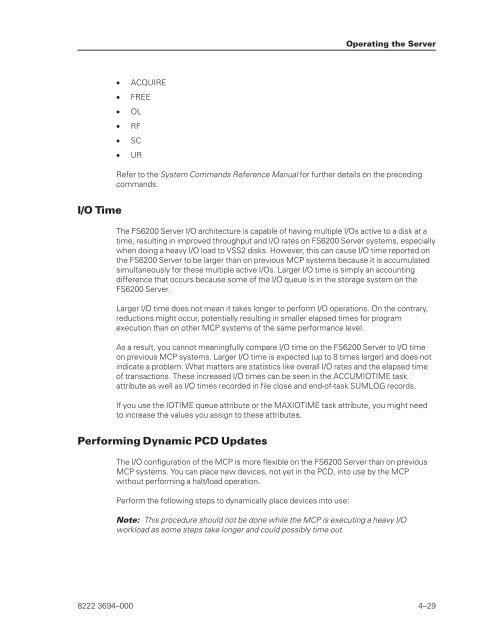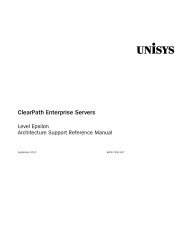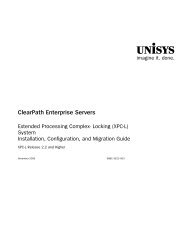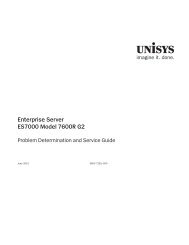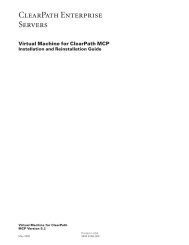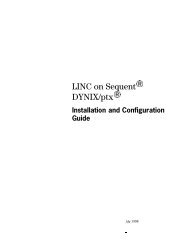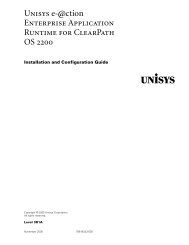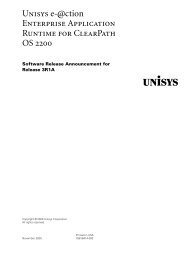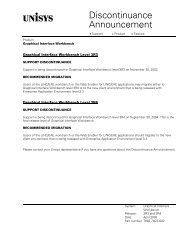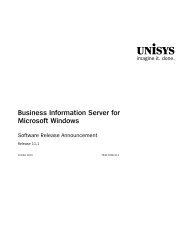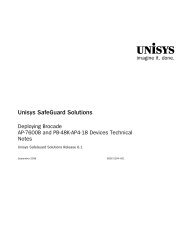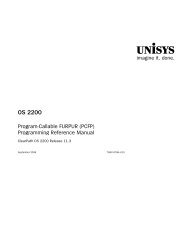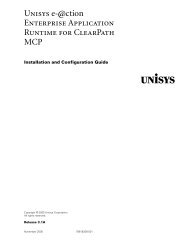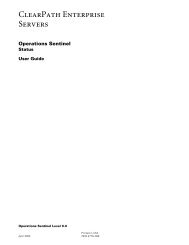FS6200 Server System Implementation Guide - Public Support ...
FS6200 Server System Implementation Guide - Public Support ...
FS6200 Server System Implementation Guide - Public Support ...
You also want an ePaper? Increase the reach of your titles
YUMPU automatically turns print PDFs into web optimized ePapers that Google loves.
I/O Time<br />
• ACQUIRE<br />
• FREE<br />
• OL<br />
• RF<br />
• SC<br />
• UR<br />
Refer to the <strong>System</strong> Commands Reference Manual for further details on the preceding<br />
commands.<br />
The <strong>FS6200</strong> <strong>Server</strong> I/O architecture is capable of having multiple I/Os active to a disk at a<br />
time, resulting in improved throughput and I/O rates on <strong>FS6200</strong> <strong>Server</strong> systems, especially<br />
when doing a heavy I/O load to VSS2 disks. However, this can cause I/O time reported on<br />
the <strong>FS6200</strong> <strong>Server</strong> to be larger than on previous MCP systems because it is accumulated<br />
simultaneously for these multiple active I/Os. Larger I/O time is simply an accounting<br />
difference that occurs because some of the I/O queue is in the storage system on the<br />
<strong>FS6200</strong> <strong>Server</strong>.<br />
Larger I/O time does not mean it takes longer to perform I/O operations. On the contrary,<br />
reductions might occur, potentially resulting in smaller elapsed times for program<br />
execution than on other MCP systems of the same performance level.<br />
As a result, you cannot meaningfully compare I/O time on the <strong>FS6200</strong> <strong>Server</strong> to I/O time<br />
on previous MCP systems. Larger I/O time is expected (up to 8 times larger) and does not<br />
indicate a problem. What matters are statistics like overall I/O rates and the elapsed time<br />
of transactions. These increased I/O times can be seen in the ACCUMIOTIME task<br />
attribute as well as I/O times recorded in file close and end-of-task SUMLOG records.<br />
If you use the IOTIME queue attribute or the MAXIOTIME task attribute, you might need<br />
to increase the values you assign to these attributes.<br />
Performing Dynamic PCD Updates<br />
The I/O configuration of the MCP is more flexible on the <strong>FS6200</strong> <strong>Server</strong> than on previous<br />
MCP systems. You can place new devices, not yet in the PCD, into use by the MCP<br />
without performing a halt/load operation.<br />
Perform the following steps to dynamically place devices into use:<br />
Operating the <strong>Server</strong><br />
Note: This procedure should not be done while the MCP is executing a heavy I/O<br />
workload as some steps take longer and could possibly time out.<br />
8222 3694–000 4–29


